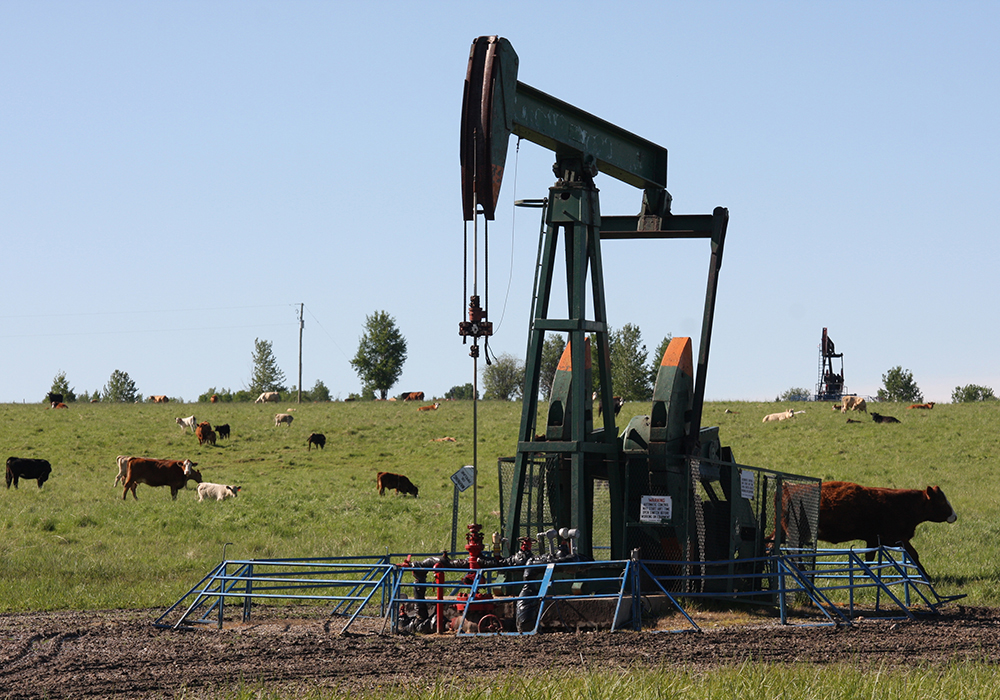‘If I don’t pay my taxes, you guys take my land away; if they don’t pay, it’s really nothing,’ Alta. councillor says about sector
If there is one message southern Alberta rural landowners are telling an all-party legislative committee on property rights, it’s that oil and gas companies are not living up to their financial commitments.
“If I don’t pay my taxes, you guys take my land away,” Ross Ford, Warner County councillor, told the committee during their stop in Medicine Hat. “If they don’t pay, it’s really nothing.”
The issue of oil and gas companies being delinquent in paying property taxes to municipal governments or lease payments to landowners was the dominant theme the select special committee on real property rights heard during stops in Medicine Hat, Fort Macleod, Hanna and Eckville.
Read Also

Volatile temperatures expected for this winter
DTN is forecasting a lot of temperature variability in the Canadian Prairies this winter. Precipitation should be close to average.
The committee was formed a year ago to examine legal remedies for landowners deprived of use of their property, to explore the idea of having property rights protected in Alberta’s constitution and to determine if the law of adverse possession should be abolished.
But while adverse possession, also known as squatter’s rights, was another main theme the committee heard, the treatment of rural landowners by energy companies has come up repeatedly during a year of submissions to the MLAs sitting on the panel.
That issue was again echoed by Taber-area farmer Daryl Bennett, director with the Action Surface Rights Association and Alberta Surface Rights Federation.
Bennett outlined the social contract between landowners, oil and gas companies, as well as government: property owners are compensated for surface land used by companies accessing crown resources, who are also required to clean up abandoned infrastructure.
“Unfortunately, this social contract has been breaking down,” Bennett told the committee in Fort Macleod.
He also raised the practice of well transfers, as did others, and that landowners receive no notification when a new company takes over oil and gas infrastructure.
“Landowners must now watch the AER’s (Alberta Energy Regulator) website to see if companies are trying to transfer wells on their own land to another company, especially orphan wells,” Bennett said to the committee. “This is a ridiculous process as the vast majority of landowners will not even know of this process and requirement. Industry should be required to notify landowners of changes in ownership of oil and gas infrastructure on their lands, especially if orphan wells are involved.”
The friction between landowners and oil and gas companies is an issue Alberta land agent Kris Bower said he is seeing across the province.
“Lots of the points the landowners are bringing up today we’ve been seeing for a few years now, from the nonpayment to the attempted reduction of acreage to forced reduction of compensation,” he told the committee in Hanna.
Much of the problem is a growing communications breakdown between the two groups, said Bower. And as drilling once again starts to pick up in the province, problem companies are again looking to sink more holes in the ground.
“We’re still seeing some of those very companies that we’re here talking about today, that are not working with landowners, now coming back to Alberta landowners looking to drill new wells,” Bower told the committee. “Again, huge red flags for the landowners we work with on that.”
While the County of Warner doesn’t have a lot of oil and gas infrastructure, Ford told The Western Producer, when the issue of tax non-payments comes to the municipality, he feels there is no recourse.
“What it does is spreads the load to other people and that’s one of the things individual landowners, they have no control over that,” he said.
The committee has until June 15 to present a report to the Alberta legislature on its findings but the panel’s chair could not commit to there being any legislative amendments on offer before the province’s next election set for no later than May 2023.
“As chair of the committee and as a private member, my job is to ensure this committee has a fulsome report ready by its due date to pass on to the ministers,” said UCP member R.J. Sigurdson.
Sigurdson said the committee shares the concerns raised by rural landowners about dealing with oil and gas companies, as well as property rights as a whole.
“I think I can speak for the committee as a whole that it’s a concern. For this government, it’s a concern,” said Sigurdson.
During the four public engagement sessions held between April 12 and 14, 32 members of the public addressed the committee.
















